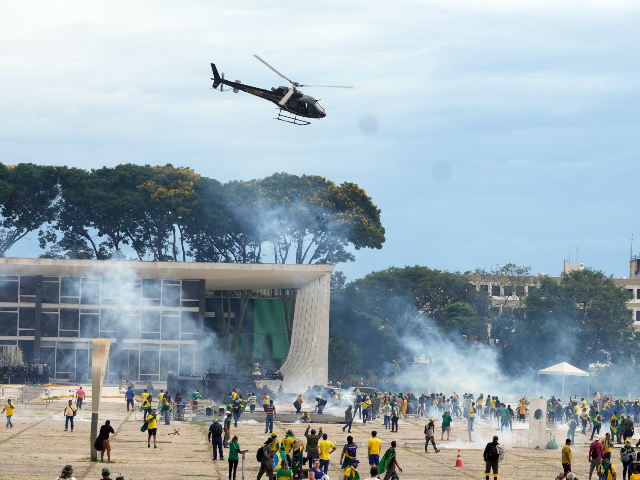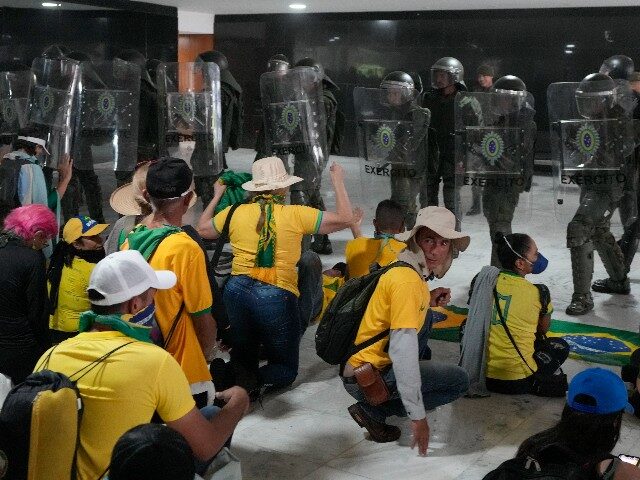The head of Brazil’s Supreme Federal Tribunal (STF), Alexandre de Moraes, ordered the provisional release on Wednesday of a group of 149 women accused by the Brazilian Attorney General’s office of participating in the January 8 riots.
On that day, thousands of supporters of former President Jair Bolsonaro stormed the capital, Brasilia, causing significant property damage to the Brazilian Congress, the president’s office, and the STF headquarters. No deaths and only minimal injuries were documented.
Through an official statement, the STF announced that it “prioritized” the analysis of the situation of the women accused of participating in the January 8 riots as part of the Brazilian top court’s framework during the week of International Women’s Day, celebrated on March 8.
In the court’s ruling, De Moraes, with a favorable opinion from the office of Brazil’s Attorney General, applied precautionary measures to the group of women, who remain charged with incitement to crime and conspiracy according to the Brazilian Penal Code.
If found guilty of both charges, the women could face a combined prison sentence of up to three and a half years in addition to a fine.

Protesters, supporters of Brazil’s former President Jair Bolsonaro, clash with police as they storm the Planalto Palace in Brasilia, Brazil, Sunday, Jan. 8, 2023. Planalto is the official workplace of the president of Brazil. (AP Photo/Eraldo Peres)
The Brazilian top court continued its official statement by informing that, due to the seriousness of the January 8 incident, the attorney general did not offer an agreement of no criminal prosecution to any of the women as “the incitement and the formation of the criminal association aimed at the violent takeover of the Democratic State of Law” that the women are being accused of having participated in is “incompatible” with the measure.
Despite that, De Moraes reasoned that the majority of the women accused do not present a risk to the Brazilian government’s January 8 legal proceedings nor do they present a risk to Brazilian society as they are not the “main perpetrators or financiers of the depredation.”
The STF announced that with the newly released group, it had so far granted provisional releases to 407 women; 82 will remain in custody during their judicial proceedings.
Out of the 82 that remain in custody, 61 have had their requests for provisional release denied by the Brazilian top court because they stand accused of more serious crimes. The STF has determined that it is necessary that the 61 women remain in custody to “guarantee public order and criminal procedure.”

President of Brazil Jair Bolsonaro looks on after a press conference two days after being defeated by Lula da Silva in the presidential runoff at Alvorada Palace on November 1, 2022, in Brasilia, Brazil. (Andressa Anholete/Getty Images)
Four women out of the group of 149 were released under exceptional measures, due to comorbidities, cancer, and for having responsibilities with children with special needs. Unlike the larger group, these four women are also being charged with armed conspiracy, violent abolition of the Democratic State of Law, coup d’état, damage qualified by violence and serious threat with use of inflammable substance against the patrimony of the Union and with considerable damage to the victim, and deterioration of the listed heritage as specified by Brazilian law.
Similarly to other men and women charged with participating in the January 8 riots and provisionally released by the STF, the newly released group of women have had their Brazilian passports annulled and are prohibited from leaving the country. A strict curfew during nighttime and weekends has also been imposed on them, which is to be enforced by means of an electronic anklet.
Additionally, the 149 women are obligated to appear before the corresponding local court every Monday and have been prohibited from using social media or communicating with any other person accused of participating in the January 8 riots through any means. Any firearm carry permit that they may have had has been completely suspended.
Christian K. Caruzo is a Venezuelan writer and documents life under socialism. You can follow him on Twitter here.

COMMENTS
Please let us know if you're having issues with commenting.